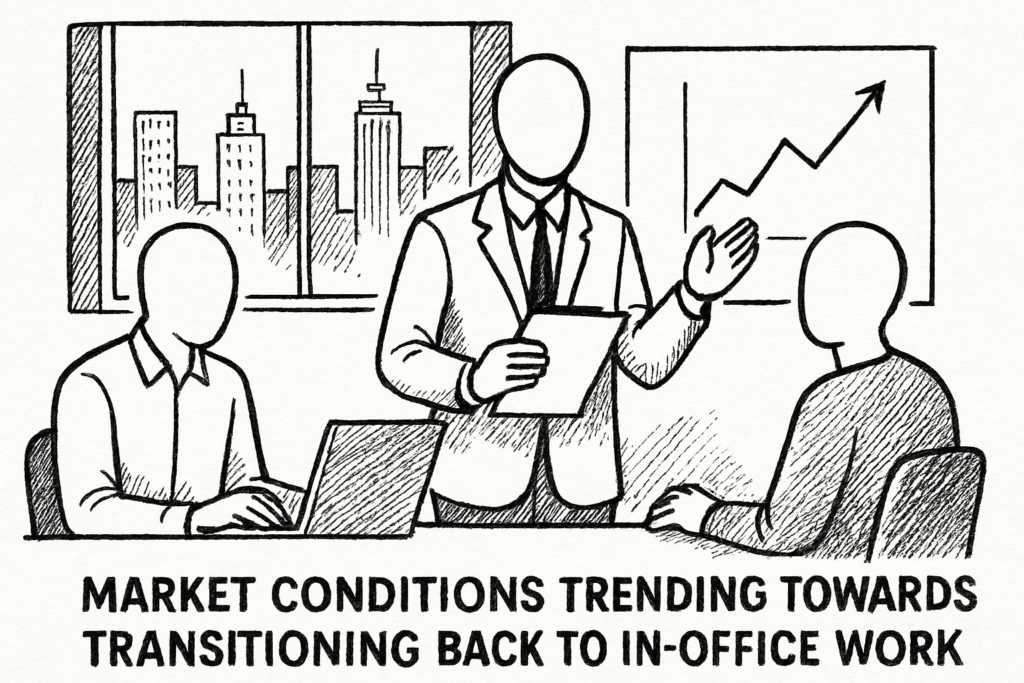Tech Companies Transitioning Back to Office

Tech Companies Back to Office return are creating opportunity in Manhattan for small to mid size commercial tenants. After years of remote work reshaping the landscape of office leasing, recent data shows a notable resurgence. According to a Newmark study, tech, advertising, media, and information (TAMI) tenants are seeking 7.8 million square feet of office space — an 86% increase from the previous year.
This renewed demand for office space signals a shift in market conditions that tech companies can strategically leverage. Here’s why now is an opportune time for tech tenants to reconsider their return to the office.
1. Competitive Leasing Opportunities
While tech leasing volumes are climbing, they still remain below pre-pandemic levels. Landlords are motivated to secure tenants, offering competitive rates, tenant improvement allowances, and flexible lease terms. This means tech companies have leverage in negotiations, especially when seeking prime office space in Manhattan’s most desirable locations.
Pro Tip: Evaluate subleases, like Amazon’s recent deal for 193,431 square feet at 237 Park Ave., which often offer discounted rates compared to direct leases.
2. Reclaiming a Collaborative Edge
Despite the convenience of remote work, innovation thrives on in-person collaboration. Many tech firms, including Amazon, IBM, and Intuit, are leading the charge back to the office. Expanding at 51 Astor Place and One Madison, these companies recognize that office environments foster spontaneous idea generation, creative problem-solving, and faster decision-making.
Stat to Know: Nationally, tech accounted for 21% of office leasing volume in the third quarter of 2024, its highest share since 2021, according to CBRE.
3. Enhanced Employee Experience
Today’s office spaces are designed with employees in mind. From wellness amenities and sustainable building features to on-site cafes and fitness centers, companies can create environments that attract talent and improve retention. Moreover, leasing near transit hubs makes commutes more accessible, reducing barriers to returning to the office.
Case in Point: Companies expanding their presence often prioritize Class A buildings offering top-tier amenities, making a return to the office more appealing.
4. Establishing a Stronger Company Culture
Culture is the foundation of successful tech companies. While remote work offers flexibility, it can dilute the sense of community and mission. In-person work fosters mentorship, strengthens relationships, and reinforces a company’s values. By providing a hybrid model — like the Tuesday to Thursday office routine many companies are adopting — firms can strike the right balance.
Jeff Peck, Vice Chairman at Savills: “It’s giving companies confidence to move forward on transactions. There’s no question the market has heated up.”
5. Positioning for Growth and Stability
Tech companies expanding their physical presence often signal confidence in their long-term growth. Whether scaling up to accommodate new teams, planning for future hiring, or expanding R&D capabilities, leasing now positions companies for success. Additionally, locking in competitive lease terms before further market tightening can yield long-term financial benefits.
Marc Holliday, SL Green CEO: “We’re going to see, for the first time in a long time, tech be a meaningful part of the overall leasing.”
Final Thoughts: Embracing the New Normal
The resurgence of tech leasing in New York is not just a market trend — it’s a testament to the evolving needs of companies and employees. The hybrid model allows businesses to retain flexibility while enjoying the benefits of in-person collaboration. By making strategic moves now, tech companies can secure desirable spaces, cultivate a stronger culture, and position themselves for sustained growth.
The market is ready — is your company?


